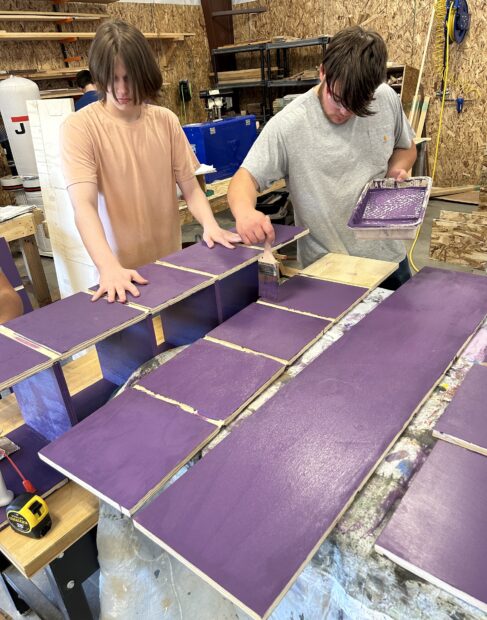
School buildings are concrete, metal, wood, glass, heating systems, desks, chairs and computers.
But to accurately describe Elevate Academy charter schools, examine their teachers’ patience, humbleness, tears of joy and frustration, open mindedness, supportive community, and manic devotion to each student’s success.
English teachers would run after hearing this sacrilege: “You are never ever going to teach Shakespeare in this building.”
Yet they stay.
“We have to meet them where they’re at, and that’s a messier job than expecting a student to walk in your room and just shut up and listen as you teach,” said CJ Watson, the Caldwell campus principal.
There aren’t many teachers willing to embrace and unconditionally support students who miss 100 days of school or who are angry at adults or who can’t read or who are suffering from depression.
Elevate is not a good fit for most teachers. “You have to be passionate about this demographic, and you have to be okay with a student cussing you out for being right,” Watson said.
An innovative education approach geared toward career readiness instead of college readiness, Elevate’s alternative school method is upending tradition. And because not every young person fits the mold, they don’t use one.
The Elevate Academy workforce model is spreading across Idaho
Post Falls in the north, Idaho Falls in the east, and Caldwell and Nampa in the west have already embraced the model, with more under consideration in the next five years.
“I was surprised at how fast it was recognized by people outside our own community, not only instate but out of state,” said co-founder Monica White. “It’s amazing how hungry people are to look at different avenues for different kids.
“When we built (the Caldwell school), our intention was to build it and run it until we retire,” White said.
But White and co-founder Matt Strong are now overseeing a growing portfolio of schools. Their flagship location in Caldwell opened in 2019. The Nampa and Post Falls campuses opened in 2022. In May, their fourth school located in Idaho Falls will begin construction.
When the schools are open and fully enrolled, they expect to educate 1,676 students across all four campuses. In the next three to four months, White and Strong will decide which metropolitan communities make sense for additional campuses.
Elevate schools serve students disenfranchised with traditional schools. Their personal needs require a new approach to education. This system recognizes talent outside of academics and provides an opportunity to be a positive contributor.
“Our workforce is really dwindling in the community, but Elevate allows our school to partner with businesses and create a workforce,” White said.
School choice is helping Elevate students find their individual genius
The American Federation for Children (AFC) located in Dallas selected 2022 Elevate graduate Domionique Valenzuela, 19, to attend a six-week internship program at the University of Arkansas. The AFC organization is a national proponent for school choice.
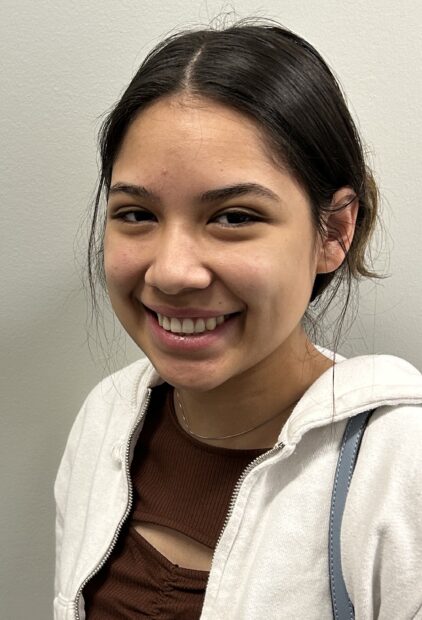
“I’m pretty excited,” said Valenzuela. “I’m speaking about my perspective on how a school of choice helped me succeed, and how it helped me become the person who I am.”
Valenzuela transferred from the public school in her sophomore year, because she was struggling with the educational environment.
Feeling unmotivated, alone and pushed away, Valenzuela said, “It honestly felt like there was no point for me going to school.”
Elevate’s teachers provided small group and one-on-one instruction to ensure their lessons are retained.
“Somebody has to be sitting right next to me guiding me through what I’m learning,” she said.
After she completes the internship this summer, she will start pursuing a bachelor’s degree in business at the College of Western Idaho, with plans to finish at Boise State University.
She hopes to be an entrepreneur and operate a small business in Caldwell, like the one she works at, the Hamburger Connection.
Eighteen-year-old Saray Camacho will graduate in June and begin pursuing a career in law enforcement.
Camacho enrolled at Elevate her freshman year to learn a trade. In public school, she was late to class a lot and had lost interest, because she didn’t understand what was being taught.
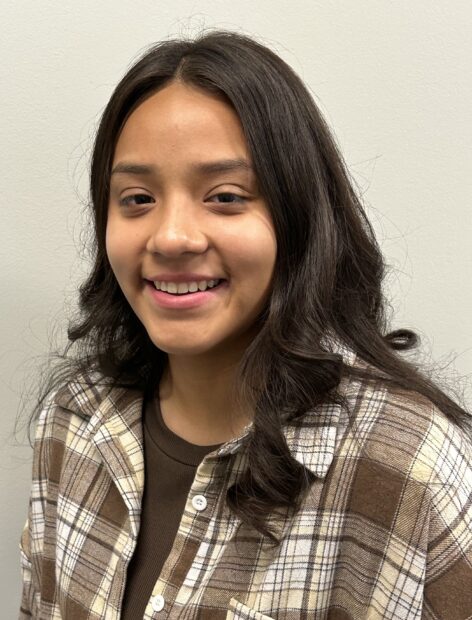
But Camacho found a mentor in her criminal justice teacher, Heather Ramos.
“The fact that she helps youth around here, so I kind of take her as an inspiration. I want to be like her,” Camacho said.
Camacho is the daughter of Mexican immigrants and Spanish is her first language. “I’m very excited to be the first one to go to college in my family,” she said. “I didn’t even know it was a possibility.”
She plans to attend CWI and BSU to pursue a criminal justice degree. She hopes to get a job in the Caldwell area in juvenile probation and work with at-risk teenagers.
“Initially, I think people have a negative view on alternative schools. But I think everybody in my class is kind of proud to be at Elevate,” she said.
Teachers help students avoid their own life mistakes
Because Elevate is tied to Caldwell industry partnerships, traditional core classes teach content that’s relevant to a trade or to an individual student’s needs.
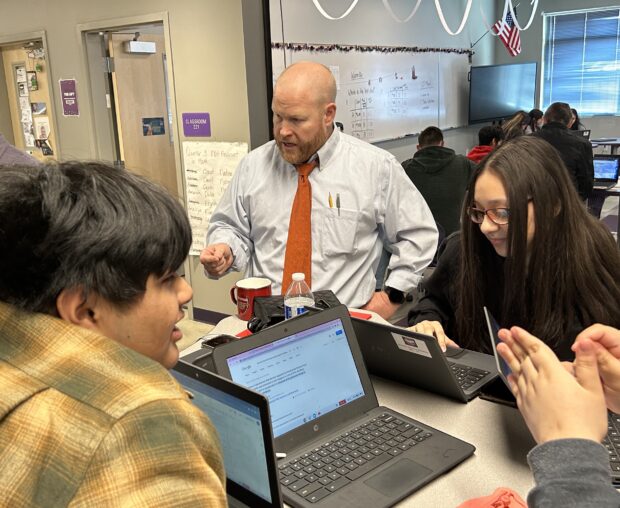
Their graduates are ready to join the Caldwell workforce, which transforms generational cycles of poverty and violence, Watson said.
Those trades include criminal justice, culinary, automotive manufacturing, welding, construction, graphic arts, business and marketing, and the medical arts. Every student studies each trade for five weeks and specializes in one by their junior or senior year.
“If we can make English or math relevant to construction, and if we can make it tangible for a student, then all of a sudden you’re tapping into their genius,” Watson said.
“I think that’s why you see a lot of success in this building,” he added.
Charter schools are meant to be a place of choice for students as well as teachers.
“The teachers that I have here also will not do well teaching in a traditional environment, because they love the chaos, they collaborate a ton and they’re trying new and innovative things all the time,” Watson said.
“I think we have a building that is solely focused on making decisions for students, not for the convenience of adults.”
This school measures success beyond traditional test scores
Elevate intentionally recruits students who have struggled in the traditional education environment so the school’s standardized test scores are low.
In Caldwell, 64% of the students are minorities, 19% are disabled and 75% economically disadvantaged. Last year, only 29% of students demonstrated proficiency in English and language arts, while only 8% demonstrated proficiency in math, according to the State Department of Education.
But there are other measures of success.
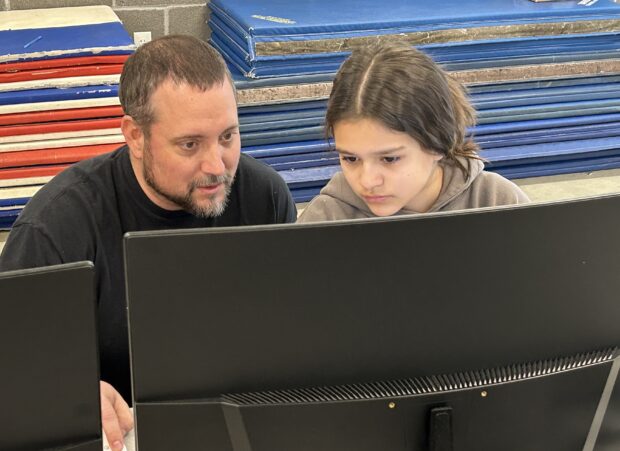
“There needs to be a larger lens of success besides testing. And this place proves that it’s working in a different way,” Watson said.
- Every student has an individualized post-graduation plan — or they don’t graduate.
- Classroom engagement measures students’ progress rather than one-time scores.
- Students’ attendance records show vast improvement.
- Students believe they can actually graduate and do something with their life.
- 85% of the seniors graduate into the workforce, military or college.
- Students understand how to operate a legitimate business and they earn money.
“Over time, students then believe in themselves. And then once we have that, and we show them the different opportunities they can have, we can get them to do anything,” Watson said.
